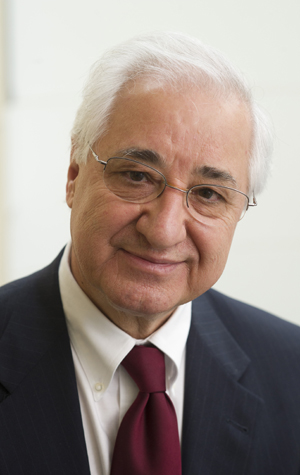BU Sues Leading Tech Firms for Patent Infringement
Dispute involves popular smartphones, tablets, other devices

Apple’s iPhone 5 is among the popular devices alleged by BU to use a professor’s patented invention without permission. Photo courtesy of Flickr contributor GadgetMac
The University has filed a number of lawsuits against some of the brightest stars in the high-tech constellation—Microsoft, Motorola, Sony, and BlackBerry among them—to defend a College of Engineering professor’s patented material used in the production of blue LEDs (light-emitting diodes), which are components in many electronic devices.
The lawsuits, like several others filed earlier this year, claim that the companies made use of Theodore Moustakas’ invention without securing a license from the University. The ENG professor of electrical and computer engineering is the recipient of the University’s 2013 Innovator of the Year Award. BU alleges that the companies are making or selling products that have used Moustakas’ invention without permission and is requesting a jury determination of damages owed the University. The earlier lawsuits target such giants as Apple, Amazon, Hewlett-Packard, Samsung, and LG Corporation.
BU Provost Jean Morrison emphasizes the importance of the University’s protecting the research and invention of one of its faculty, particularly when unlicensed use has become so widespread. “We’re protecting our intellectual property,” she says. “We are an Association of American Universities research university and as such, the creation of new knowledge is fundamental to our mission. Ted Moustakas created a process that significantly improves the performance of these products. It’s incredibly important for a university to defend its intellectual property.”
Morrison says the number of defendants—close to 40—reflects the demand for handheld devices whose performance is improved by Moustakas’ invention and the prevalence of companies using the technology without a license from the University. The defendants include makers of both LEDs and of consumer products using those LEDs. The University alleges that companies infringe the patent in selling, among other products, the iPhone 5, iPad, and MacBook Air from Apple; Samsung’s Galaxy Tab 2; Amazon’s Kindle Paperwhite 6”; and Hewlett-Packard’s Pavilion 14 Chromebook, Slate 7 tablet, and Pavilion 20xi IPS.

“These devices are used by huge numbers of people,” the provost says. “This is first and foremost about protecting our intellectual property and recognizing Professor Moustakas’ pioneering work. We put a great deal of careful thought into the decision to proceed with these lawsuits.”
Microsoft, Motorola, and Sony did not respond yesterday to requests for comment. Blackberry, LG, and Hewlett-Packard declined comment on the suits, which are filed in the United States District Court for Massachusetts, because the defendants do business in the state. Amazon, Samsung, and Apple did not respond to previous requests for comment; Apple earlier had declined to comment on the litigation to the Boston Herald.
At issue is the production of “highly insulating monocrystalline gallium nitride thin films,” which enable the manufacture of blue LEDs usable in products such as flat panel displays on handheld devices and televisions, as well as in general lighting. The primary patent asserted in the litigation was issued in 1997, based on an application first submitted in 1991. Blue LEDs are especially attractive because they can create white light under certain conditions, says Vinit Nijhawan, managing director of BU’s Office of Technology Development. Nijhawan says Moustakas’ invention makes those LEDs more effective and easier to produce.
To verify suspicions of patent infringement, the University retained Dallas-based law firm Shore Chan DePumpo, specialists in intellectual property law who have worked for other major research universities here and abroad (including Penn State, the Universities of Virginia and Texas, and the California Institute of Technology). Shore Chan DePumpo hired consultants and laboratories to “reverse engineer” each defendant’s products. Nijhawan says the experts dismantled devices and “cross-sectioned the LEDs into incredibly tiny samples. These samples were analyzed using several state-of-the art techniques, including transmission electron microscopy, X-ray diffractometry, and secondary ion mass spectroscopy. The analytical data were reviewed by several independent scientific experts before any legal allegations were made.”
Even then, the University filed suit “only after meeting with several alleged infringing manufacturers and affording them a fair opportunity to take a license at a reasonable royalty,” he says. “Several of those manufacturers refused to negotiate a reasonable royalty, thereby forcing Boston University to proceed with litigation.”
Moustakas says his patented invention was licensed to several companies that “are disadvantaged, because they paid to use the technology, while others are using it without compensating the owner of the intellectual property, which is Boston University.” Abiding by patent law, he says, is essential “in the development of modern technologies.”

Comments & Discussion
Boston University moderates comments to facilitate an informed, substantive, civil conversation. Abusive, profane, self-promotional, misleading, incoherent or off-topic comments will be rejected. Moderators are staffed during regular business hours (EST) and can only accept comments written in English. Statistics or facts must include a citation or a link to the citation.